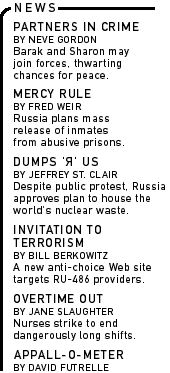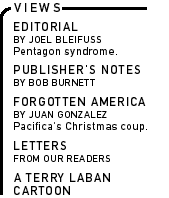

|

|

|

|
| |
|
|
|
Concerned about an apparent increase in illness and cancers among veterans of the war in Yugoslavia, U.S. allies are requesting a formal inquiry into so-called "Balkan Syndrome" and the safety of depleted uranium (DU) munitions. Britain and the United States oppose this move. But Sir Peter de la Billiere, the head of the British forces during the Gulf War, is calling for expanding the investigation into claims that DU could be a factor in Gulf War Syndrome. During the Gulf War in 1991, allies fired more than 100,000 DU shells at Iraqi targets. During the conflict in Bosnia, the United States fired about 10,000 DU shells between 1994 and 1995. And most recently, in the war in Yugoslavia in 1999, U.S. jets fired 31,000 DU shells. DU has several advantages. It is hard and heavy, and when deployed on the tips of missiles and bullets, it can easily pierce the heavy armor plating on tanks. Other types of shells work nearly as well, such as those made from tungsten alloys, but depleted uranium has one tremendous advantage over tungsten. It is provided to weapons manufacturers free of charge by the U.S. government, as an ingenious method of radioactive waste disposal. Two types of DU exist. "Clean" DU is a by-product of the processing of uranium ore into uranium-235 (which is used in nuclear fuel and weapons). The other type is created at government facilities as a by-product of reprocessing spent nuclear fuel (done to to extract plutonium for nuclear warheads), and is known as "dirty" DU because it contains highly toxic plutonium and other radioactive materials. Until recently, it has always been assumed that DU armaments were made from clean DU. Last November, U.N. researchers examined 11 sites in Kosovo hit by DU shells and found radioactive contamination at eight of them. Further, those tests uncovered evidence that at least some of the DU munitions in the U.S. arsenal used in Kosovo contained "dirty" DU. This raises the question: How much of its plutonium-processing waste did the U.S. government supply to weapons manufacturers? What's more, when DU (both clean and dirty) shells hit armored plates they vaporize in the intense heat, releasing a toxic dust of uranium oxide. That--along with the possibility that the shells are made from dirty DU--could help explain why about 300 of 5,000 Serbian refugees whose Sarajevo suburb was heavily bombed by NATO jets in 1995 have since died of cancer. According to a 1998 report by the Agency for Toxic Substances and Disease Registry, the inhalation of DU particles can lead to symptoms that include fatigue, shortness of breath, lymphatic problems, bronchial complaints, weight loss and an unsteady gait--symptoms that match those of sick veterans of the Gulf and Balkan wars. And a November 1999 guideline that NATO sent to its commanders warned, "Inhalation of insoluble depleted uranium dust particles has been associated with long-term health effects, including cancers and birth defects." The official U.S. position is that DU is hazardous only in that it is a heavy metal. In a speech to the National Press Club, outgoing Secretary of Defense William Cohen explained, "Where it's unsafe, it's like leaded paint. Leaded paint does not pose a problem to you unless it starts to peel and then children or others ingest it." He acknowledges that the inhalation of uranium oxide dust created in the intense heat of a DU shell impact could pose a health risk, yet he pledged that the United States will "continue to use this depleted uranium." The Pentagon can be slow to change its mind. Veterans involved in the testing of atomic bombs and the citizens who lived downwind from those test sites fought for decades to make the government acknowledge that their chronic health problems were probably due to radiation exposure. German Chancellor Gerhard Schršder has called for a ban on shells
made from DU. That would indeed be a sensible place to start. Next
we might take up Yugoslavian President Vojislav Kostunica's suggestion:
"We should be discussing the depleted conscience of those who used
the notorious depleted uranium."
For more information on DU, visit the Campaign Against Depleted Uranium website: www.cadu.org.uk |

